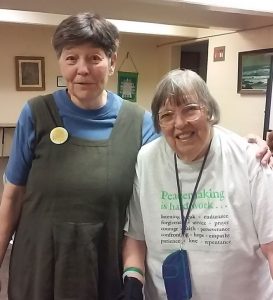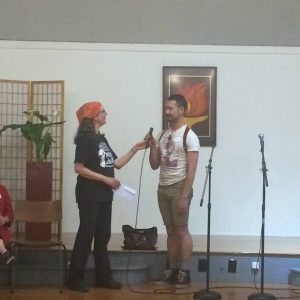In Campaign Nonviolence’s recent conference call, Metta Center for Nonviolence staffers Michael Nagler and Stephanie Van Hook talked about Gandhi’s concept of a constructive program. War tax resisters have a history of giving away their resisted taxes to worthy causes, and we have sometimes called this a “constructive program” in the model of Gandhi.

War tax resisters Pam Allee and Ann Huntwork at the Portland, OR redirection ceremony.
For decades, war tax resisters have deposited money in “alternative funds” that serve multiple purposes. The interest earned through these funds, often invested in community development credit unions and community loan funds, is distributed as grants to organizations. The depositors can withdraw the money if they wish. War tax resisters can also give money away to alternative funds for redistribution. (And some groups don’t have an official alternative fund but redirect their taxes collectively to other groups.)
Alternative funds are great, and they have some limitations. They give away a relatively limited amount of money (although the People’s Life Fund in the Bay Area gave away $30,000 in 2015). They typically spread their grants among many groups, so individual grants aren’t large. Grants aren’t likely to be the seed for big projects like starting a cooperative house or community garden, or closing a military base. But it is still a collective action that has a greater impact than individual redirection of taxes.
But also, war tax resisters are a pretty stubborn bunch. We don’t always agree on a course of action and we have different ideas about how we want the world to look. Many of us don’t give to alternative funds at all, preferring to redirect resisted taxes to our own favorite causes.
Gandhi’s constructive programs were large and concrete projects, like gathering salt, founding ashrams, or weaving cloth. They engaged thousands of people in positive projects that both benefited themselves and benefited others. In war tax resistance, our efforts are relatively small and scattered, and we often give taxes away to groups that we support, but we are not part of. I wonder if approaching war tax redirection as a sort of grantmaking endeavor might increase the social distance between ourselves and the groups we seek to support. (Friends in alternative funds: how does the granting process works for you?)
David Gross recently floated the idea of NWTRCC setting up a donation portal for organizations to use to receive donations from war tax resisters. During the first year of the War Tax Boycott, NWTRCC asked people to redirect their taxes to specific organizations (Direct Aid Initiative in Iraq and Common Ground Health Collective in New Orleans) but we did not have much success tracking how much we gave. Setting up a donation portal could help us track the money, although it still might seem very charity-oriented. However, I think it would establish public and direct relationships between resisters and a specific organization.

Susan Quinlan gives a People’s Life Fund grant to Steven Funk for Veteran Artists to #popthebubble — 2016 Granting Ceremony at Berkeley Fellowship of Unitarian Universalists.
A few years ago, I thought of setting up a war tax resisters’ revolving loan fund that would specifically support cooperatives and other alternative economy projects. Recently, I’ve wondered whether the best use for war tax resistance dollars might be funding projects aimed at reducing militarism (such as counter-recruitment projects or civil disobedience at bases). I have also wondered whether it is more strategic to make larger and fewer grants, rather than many small grants. So then I ask myself: Do I start another alternative fund? Do I support existing funds?
Michael Nagler suggested that the only sort of nationwide constructive program we might be able to do in the United States is “creating a new story” about what people can accomplish together and what our world can look like. He doesn’t think the US can support a concrete constructive program. While I don’t hold out much hope for any nationwide constructive program, I hope that war tax resisters will figure out new ways to make our redirected dollars count, and to increase the quality of our connections with other groups.
I’m tossing some ideas and thoughts out here. What do you think? Are there other new ways to approach redirection of our war taxes? What are the “most constructive” programs?
Post by Erica
P.S. Subscribe to this blog to get a notification of each new post! In the navigation column to the right (or at the bottom of this post if you’re on a phone or tablet), under Subscribe to the Blog, enter your e-mail address and click Submit.

What a terrific blog. I have to say though that there are concrete constructive programs going on all over the country. Just to name a few: solar energy, community land trusts, conservation land trusts, organic farming, affordable farms in perpetuity, hour exchanges and alternative currencies, food coops….and on and on. Even if our vote is stolen, we as a society are beginning to realize that we can “vote” with our dollars, including resisted tax money.